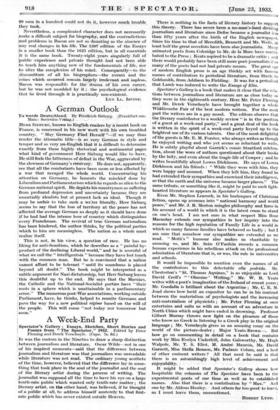A Week-End Party
Spectator's Gallery : Essays, Sketches, Short Stories and Poems from " The Spectator," 1932. Edited by Peter Fleming and Derek Verschoyle. (Cape. 7s. 6d.)
IT was the custom in the Nineties to draw a sharp distinction ! between journalism and literature. Oscar Wilde—not in one of his inspired moments—said that the difference between journalism and literature was that journalism was unreadable while literature was not read. The ordinary young aesthete
of the time, however, belieied that the difference lay in some- thing that took place in the soul of the journalist and the soul
tof the literary artist during the process of writing. The journalist was supposed all the time to have his eye on a large tenth-rate public which wanted only tenth-rate matter ; the literary artist, on the other -hand, was believed, if he thought of a public at all, to address himself austerely to that first-
rate public which has never existed outside Heaven. There is nothing in the facts of literary history to support this theory. There has never been a no-man's-land dividing journalism and literature since Defoe became a journalist less than fifty years after the birth of the English newspaper. Since his time to that of Meredith, Bennett and Mr. Wells, at least half the great novelists have been also journalists. Many animated poets from Coleridge to Mr. de la Mare have contri. buted to the Press ; Keats aspired to be a dramatic critic ; and
there would probably have been still more poet-journalists if so many of the poets had not had private means. The great age of modern English prose is an age thickly set with famous names of contributors to periodical literature, from 'Steele to Goldsmith, from Addison to. Fielding. It was for a-periodical that Lamb was induced to write the Essays of Elia.
Spectator's Gallery is a book that makes it clear that the rela- tions between journalism and literature are as close today as they were in the. eighteenth century. Here Mr. Peter Fleming and Mr. Derek Verschoyle have brought together a whole Widdicombe Fair of the best modern writers. For the most part the writers are in a gay mood. The editors observe that the literary contributor to a weekly review " is in the position of a guest at a week-end party," and a great deal of the book is written in the spirit of a week-end party keyed up to the brightest use of its various talents. One of the most delightful of the guests is Mr. E. M. Forster, who always writes as though he enjoyed writing and who yet seems so reluctant to write. He is subtly playful about Garrick's comic Stratford celebra, tion, about the woes of authors questioned about their books by the laity, and even about the tragic life of Cowper ; and he writes beautifully about Lowes Dickinson. He says of Lowes Dickinson and his friends : " While they were with him, they were happy and amused. When they left him, they found he had extended their sympathies and exercised their intelligence, so that the earth and the universe became larger places." The same tribute, or something like it, might be paid to such light- hearted literature as appears in Spectator's Gallery.
Even Mr. Stephen Leacock, in his burlesques of Christmas fiction, opens up avenues into " national harmony and world peace," and Mr. J. B. Morton mingles philosophy and farce in his account of a world in which it is the latest craze to stand on one's head. I am not sure in what respect Miss Rose Macaulay extends our sympathies in her inquiry- into the reasons for the high reputation of Family Life in a world in which so many famous families have behaved so badly ; but I am sure that somehow our sympathies are extended as we read. " Moth's " humour also makes us charitable by amusing us, and Mr. Seiti O'Faoliiin records a common human experience in his rebellious attack on the professional admiration of literature that is, or was, the rule in universities • and schools.
It would be impossible to mention even the names of all the contributors to this delectable olla podrida. Mr. Chesterton's "St. Thomas Aquinas," is as enjoyable as Lord David Cecil's " Obscene ' Writing." Mr. W. B. Yeats writes with a poet's imagination of the Ireland of recent years ; Mr. Guedalla is brilliant about the Argentine ; Mr. C. E. Mi Joad shows how lucid an expositor he can be in his contrast between the materialism of psychologists and the increasing anti-materialism of physicists ; Mr. Peter Fleming at once entertains and suits us with an account of 'an adventure in North China which might have ended in drowning. Professor Gilbert Murray throws new light on the pleasure of those who know no Greek in listening to a Greek play in the original language ; Mr. Verschoyle gives us an amusing essay on the world of the picture-dealer ; Major Yeats-Brown—. But how go on commenting in detail on a book that contains work by Miss Evelyn Underhill, John Galsworthy, Mr. Hugh Walpole, Mr. T. S. Eliot, M. Andre Maurois, Mr. David Garnett, Miss Stella Benson, Mr. Padraic Colum, and a host of other eminent writers ? All that need be said is that there is an astonishingly high level of achievement and enjoyability. : It might be added that Spectator's Gallery shows how hospitable the columns of The Spectator have been to the experimental poets of our time as well as to established names. Also that there is a contribution by " Max." And one by Mr. Aldous Huxley. And others far too good_to leav6, as I must leave them, unmentioned.
ROBERT LYND.








































 Previous page
Previous page